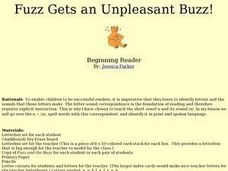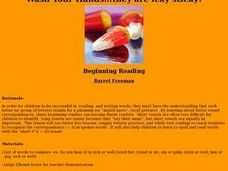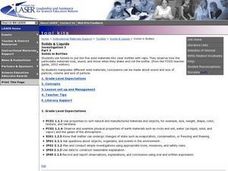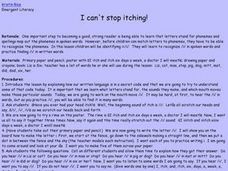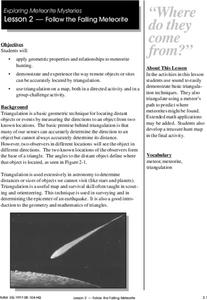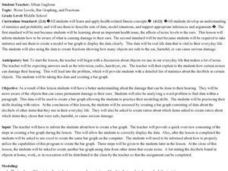Curated OER
Fuzz Gets a Big Buzz
First graders recognize the short vowel u in written and spoken language. Through listening activities, they discriminate the vowel sound /u/ from other phonemes. Students identify the phoneme and letter in a decodeable story they read...
Curated OER
Say aahhh....said the doctor
Learners recognize the short vowel O in written and spoken language. Through matching activities, they discriminate the short vowel /o/ from other vowel sounds. Students associate the phoneme with its letter representation and identify...
Curated OER
Fuzz Gets an Unpleasant Buzz
First graders recognize the short vowel u in written and spoken language. Through listening activities, they discriminate the vowel sound /u/ from other phonemes. Students associate the phoneme with its letter representation and identify...
Curated OER
A Punch in the Gut
Students recognize /u/ in spoken words by observing a meaningful representation and a letter symbol. They then practice finding /u/ in words. They listen to the story "Fuzz and the Buzz" and identify the words they hear with the /u/.
Curated OER
Simple Simon Saves the Day
Students recognize, identify, and locate the /s/ sound in spoken or written words. They say a tongue twister with words emphasizing the /s/ sound. They then listen to the story "Simple Simon" and make "finger snakes" whenever they hear...
Curated OER
Munchy Munchy Macaroni
Students explore phonemes and letters. They examine the beginning sound /m/. They read "If You Give a Moose a Muffin." They listen for m words and discuss the shape their mouths make when saying the sound m. Students identify pictures...
Curated OER
The Itsy Bitsy Pig
First graders recognize the short vowel I in written and spoken language. Through matching activities, they discriminate the short vowel /i/ from other vowel sounds. Students associate the phoneme with its letter representation and...
Curated OER
Wash Your Hands...they are icky sticky!
Students engage in an emergent literacy lesson that focuses on phonemic awareness and they practice corresponding the letter "i" to its long or short sound. This type of recognition has been found to be essential to reading development.
Curated OER
House of H
Students identify the letter H and the sound it make through drawing. After identifying the letter H, students brainstorm words that begin with the letter H. In the computer lab, they use computer drawing software to create a house and...
Curated OER
We the People
Students show how the meaning of the Preamble is reflected in current American culture. They collect images and/or sounds from media sources that represent, symbolize, or explain each phrase in the Preamble and create a media...
Curated OER
All aboard the "Quiet Train"
Students identify and define that an orderly line means straight, one student behind the next, and facing forward. Then they practice boarding the quiet train where the teacher is the train captain and that if he/she hears anyone...
Curated OER
Solids in Bottles
Students use funnels to put the five solid materials into clear bottles with caps. They observe how the particulate materials look, sound, and move when they shake and roll the bottle. Finally, students write "sound and touch" poetry.
Curated OER
Music Technology
Pupils identify the features of a synthesizer and practice using them. They record different sounds using the software provided. They also examine sound waves and applications through the synthesizer.
Curated OER
Silly Snake
Students practice recognizing and sounding out the letter S. They listen to the alphabet song, "Sea Shell," by Amy Lowell, and view a large picture of a snake in the shape of the letter S. Each student points out other objects found in...
Curated OER
I Can't Stop Itching
Students recognize the short vowel i in written and spoken language. Through matching and listening activities, they discriminate the vowel sound /i/ from other phonemes. After reading the story "Liz is Six," students draw a picture with...
Curated OER
Quiet Time
First graders practice making the /sh/ sound walking around the room, pretending to be in the library. They then try to say a tongue twister containing the phoneme and practice writing the letters s and h and identify the /sh/ sound in...
Curated OER
Izzie's Igloo
Young scholars must be phonemically aware to both read and write. This means that the student must understand phonemes and the relationship between letters and sounds. In this lesson, students work on the phoneme i=/i/. Since vowels...
Curated OER
Erupting Volcano
Fourth graders watch teacher conduct the following experiment. Wearing safety goggles and old clothing is advised. The experiment could ruin clothing and hurt unprotected eyes. Follow the steps below having students write down what they...
Curated OER
Kwanzaa Language Arts: The Tambiko
Students read or hear about famous African Americans to learn about the ways in which they exemplify one of the seven principles of Kwanzaa.
Curated OER
Five Senses-Introduction
Students explore the parts of the body that are used to develop the five senses. They conduct a nature walk. Students identify the things they see, hear, smell, and touch. They create a graphic organizer to organize their answers.
Curated OER
Follow The Falling Meteorite
Students investigate the supposed traveling path of a meteorite. They use sound in order to triangulate the path. The results of the experiment are written on a map to display the path of the meteorite. The culminating activity is when...
Curated OER
I Am Tired
First graders recognize the short vowel o in written and spoken language. Through listening and matching activities, they discriminate the vowel sound /o/ from other phonemes. Students associate the phoneme with its letter representation...
Curated OER
That Sums It All Up!
Young scholars review the concept of silent reading. They listen to a story and create a story map of what they hear. Then, they read their own story and map it the same way. This time, they use this story map to write a summary of...
Curated OER
Noise Levels, Bar Graphing, and Fractions
Students research items that can damage hearing. They explore statistics about the decibels of certain objects. From the information collected, students create a bar graph. They formulate ratios to determine what sounds are harmful to...
Other popular searches
- Sound and Hearing
- Sound, Hearing
- Sound Hearing
- Science Sound and Hearing
- Hearing and Sound Experiment
- Sound and Hearing Worksheets
- Hearing Sound Experiment




